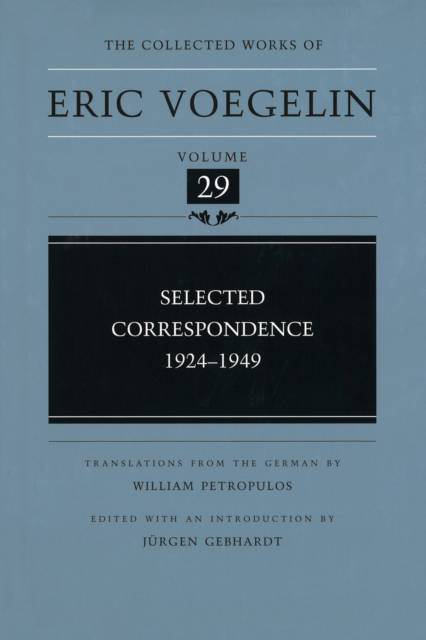
En raison d'une grêve chez bpost, votre commande pourrait être retardée. Vous avez besoin d’un livre rapidement ? Nos magasins vous accueillent à bras ouverts !
- Retrait gratuit dans votre magasin Club
- 7.000.000 titres dans notre catalogue
- Payer en toute sécurité
- Toujours un magasin près de chez vous
En raison de la grêve chez bpost, votre commande pourrait être retardée. Vous avez besoin d’un livre rapidement ? Nos magasins vous accueillent à bras ouverts !
- Retrait gratuit dans votre magasin Club
- 7.000.0000 titres dans notre catalogue
- Payer en toute sécurité
- Toujours un magasin près de chez vous
Description
This volume contains selected correspondence written by Eric Voegelin during the period 1924 to 1949.The Editorial Board of the Collected Works of Eric Voegelin agreed from the beginning that a representative number of Voegelin's letters should complete the edition in an attempt to provide the reader with insights into Voegelin's intellectual life and into the fundamental experiences that went into shaping the growth of his personality. It was the board's aim to select material in accordance with the guidelines that Voegelin himself laid down as fundamental to a hermeneutical understanding of spiritual reality. Voegelin wrote that, in studying a thinker, one must try to elucidate the biographical "radices of philosophizing." He said that one must penetrate to the "experiences that impel [him] toward reflection, and do so because they have excited consciousness to the 'awe' of existence." Voegelin made these remarks on the occasion of conducting anamnetic experiments, which reveal the motivational center of his own life. At the core of Voegelin's concept of political science is a noetic interpretation of man, society, and history that confronts the conception of order prevalent in the surrounding society with the criteria of the critical knowledge of order. From the 1930s onward, Voegelin labored to find a satisfactory self-reflexive explication of the principles of a contemplative understanding of human reality, one grounded in the spiritual experience of reason. Naturally, it is the published word that determines a thinker's scholarly stature. But Voegelin's letters also grant insight into the development of his thought; document the author's struggle with himself, the telos of his scholarship; and reveal an often involuntary conflict with his life-world. These letters shed light on an ongoing and open-ended thought process from which a multifaceted, sometimes apparently contradictory, work emerged. Because of the enormous number of letters that Voegelin wrote in his later years--now published in the second volume of the Selected Correspondence (Volume 30 of the Collected Works)-- the editors agreed that these bookswould contain only letters from Eric Voegelin. While such a selection of letters cannot provide the completeness that the publication of both dialogue partners would provide, nevertheless they reveal Voegelin's ongoing reflection on human affairs. They reveal patterns of thought and their development in the atmosphere of intimate communication that personal and intellectual "elective affinities" produce, and they also disclose the silences that accompany such discourse. This volume is certain to interest all readers concerned with political theory and with better understanding of Voegelin's intellectual pilgrimage from his earliest academic years to his emergence as one of the most significant philosophers of our time.
Spécifications
Parties prenantes
- Auteur(s) :
- Editeur:
Contenu
- Nombre de pages :
- 784
- Langue:
- Anglais
- Collection :
- Tome:
- n° 29
Caractéristiques
- EAN:
- 9780826218421
- Date de parution :
- 31-07-09
- Format:
- Livre relié
- Format numérique:
- Genaaid
- Dimensions :
- 155 mm x 231 mm
- Poids :
- 1156 g

Les avis
Nous publions uniquement les avis qui respectent les conditions requises. Consultez nos conditions pour les avis.






